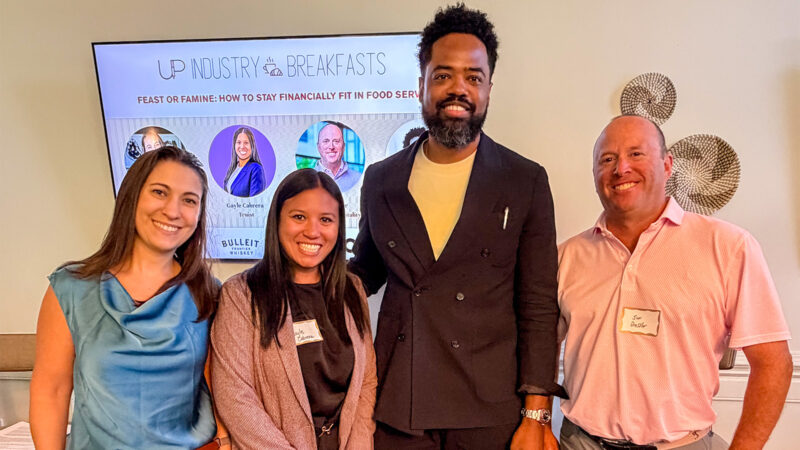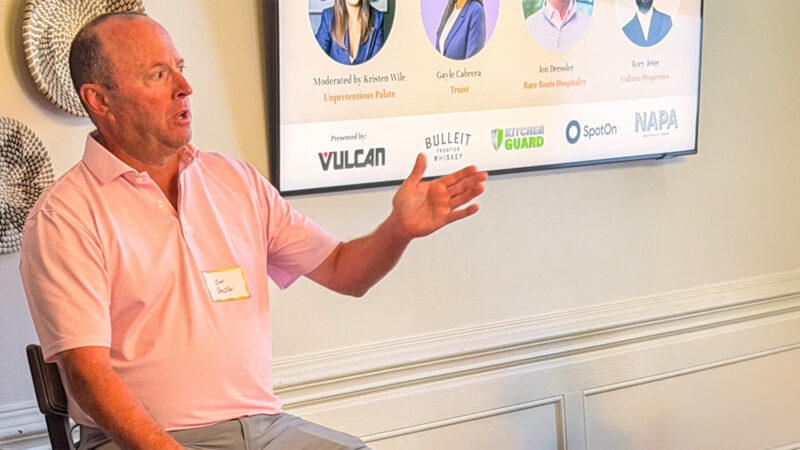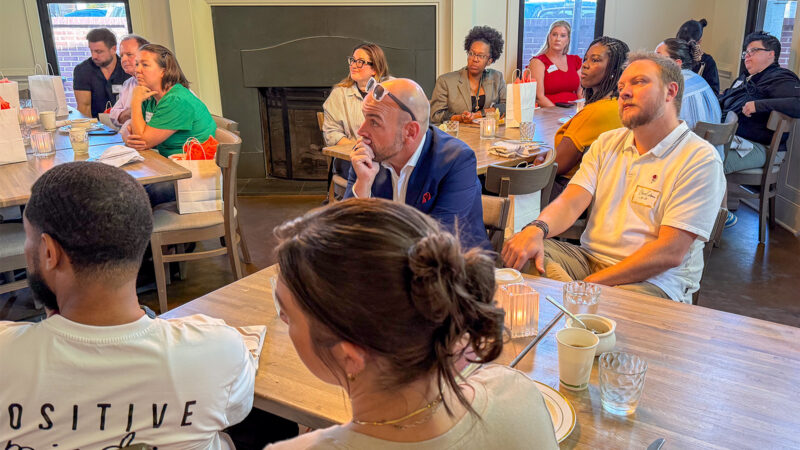September 23, 2025
Key takeaways from our “How to Stay Financially Fit in Food Service” industry breakfast
Do the math and ask questions are the cornerstones of fiscal health

by TM Petaccia
At our third Unpretentious Palate Industry Breakfast, Charlotte hospitality, financial, and real estate leaders covered many topics and insights on the financial realities of opening and sustaining a food business, but it all boiled down to two basic themes: basic math and asking questions.

Held at Napa on Providence and sponsored by Vulcan Equipment, Kitchen Garden Charlotte, SpotOn, and Bulleit Frontier Whiskey, a full room of food professionals listened and shared their own perspectives on developing and maintaining fiscal responsibility in an ever-changing, often fickle business.
“Have a dream. Remain committed to your dream, but realize that your dream can be flexible,” says Jon Dressler, co-owner of Rare Roots Hospitality. “Don’t get completely hung up on, ‘this is the only thing I’m going to do.’ There are influences from your landlord, your neighborhood, and your banking partner that can shape what’s possible.”

The panel agreed that strong preparation, whether through budgeting, building brand awareness with pop-ups, or securing flexible landlords, is essential. Dressler summed it up bluntly: “A lot of restaurants fail before they even start because owners don’t understand the math. Everything we do is math. You have revenues. You have expenses. People always comment to me how difficult restaurant business is, but if revenues exceed expenses, restaurant business is not as difficult as people make it out to be. But you have to ask questions.”
Gayle Cabrera, Small Business Director at Truist Finance Corporation echoed Dressler’s main points. “Slow and steady wins the race,” Cabrera says. “I see a lot of restaurant owners bite off more than they can chew and end up over-leveraging themselves. At the end of the day, your bank actually wants you to make money. Don’t let your ego get in the way to ask for help.”

In concert with Cabrera, Kory Jeter, founder of Cultura Properties, said too many new operators underestimate the value of professional advice. “Don’t be afraid to seek out guidance from consultants and retail brokers,” he told the audience. “Even if you think you can’t afford that person, that initial conversation is going to give you the tools, at least the language, to know how to approach a problem. Ask all the stupid questions you think are stupid, because they’re not. The more you ask, the more you’ll learn.”
Panelists also cautioned attendees to do their homework on landlords. “If five restaurants have been in a space in ten years, maybe it’s not the concept. Maybe the location just can’t support a restaurant,” Cabrera says. She adds having a good business plan is not often enough to secure financing. “Where have you built your brand awareness? Have you done pop-ups, or started with a food truck? Writing the best business plan with good graphics is one thing, but if you can’t show you can execute, it’s hard for a bank to give you financing.”

Jeter also provided some insider info to get the best deal. “Understand what the market is in terms of tenant improvements. Understand what’s the market in terms of the actual rent abatement. A lot of folks don’t know to ask, ‘Well, can I get six months free?’ Landlords are hoping that you don’t know that. You may go to a property just being excited to sign something, not knowing that you’re leaving hundreds of thousands of dollars on the table. You may find some landlords want to do something interesting. They may be willing to say, ‘Let’s partner up on this. I believe in what you’re trying to do.'”
Having a proper support system was an issue all panelists also agreed on. “Not everyone’s out to get you, but some people are,” Jeter says. “The only way to figure that out is if you talk to multiple people and get their perspectives.” Dressler added, “You are not the smartest person in the room. You have to be comfortable not being the smartest person in the room. Surround yourself with people who understand the things you don’t. Figure out what you’re not good at and find a friend, a lawyer, a broker, anyone who can help you.”
Cabrera summarized the two by saying, “What I see a lot of times is people don’t raise their hand until it’s too late, then no one can actually help you.”











